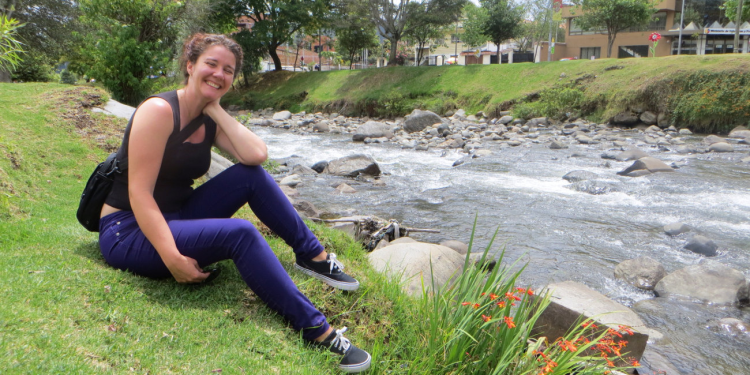
Danica comes from Canada. She has stayed in the USA and in Mexico for several years before traveling Europe. Retired, she now lives in Ecuador with her husband. In this Interview, she talks about her everyday life in Cuenca.
Where are you from, Danica, and what are you doing nowadays?
As my profile states, I'm a timid (but becoming less so) adventurer, who mostly goes along for the ride with my fearless husband, Ron. Born in Canada, I was infected with the travel bug at the age of 5, when part of my family decided to take a year to travel through the United States and Mexico. As an adult, I worked mostly to be able to travel, having several careers over a ten year span. I finally settled on working for a Credit Union, which allowed me to travel more frequently, as my seniority increased. Now I'm “retired” and focusing on writing, which has also been a passion in my life since I was small. I've published 3 novels and am working on several more.
Why did you choose to expatriate to Ecuador?
My husband and I had travelled extensively throughout North America and Europe and were looking for new places to discover. We decided that South America would be our new frontier and, after some research and a visit, we decided to relocate to Cuenca, Ecuador, so we'd have a base that would allow us to travel both South and Central America. It offers a good central location, a decent standard of living and is more affordable for us than staying in Canada.
As a Canadian expat, what where the procedures you had to follow to move there?
To stay in Ecuador, past the 90 day tourist visa requirement we applied for residency, which we received based on my husband's pension. The process changes continually and even the Ecuadorian embassies aren't always up to speed on the current requirements. Once we received residency, we opted to ship down a container of our furniture and household goods, which had to be completed within a short span of acquiring our cedula (Ecuadorian identification). Depending on the time you plan to be away from Canada you might also need to check with the Canadian government about your status as a citizen.
How long have you been in the country?
We've been here for almost three years and expect to stay a couple more.
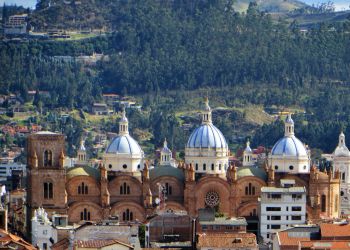
What has attracted you to Cuenca?
Cuenca is a beautiful city, with a population of around 600,000 inhabitants – not too big and not too small. The architecture is Spanish Colonial, with wending cobbled streets, very reminiscent of Europe. Coming from Vancouver, we also appreciate the surrounding mountains, but wish it was closer to the ocean.
What has surprised you the most at your arrival?
I would say the bureaucracy and level of technology utilized by the government. Many things are processed using only paper copies and hand filled-in forms. Errors are not accepted and forms must be completed again without incorrect dates, changes and other errors that are usually covered by being crossed out and initialed in North America. I was also surprised by how many expats chose to reject Spanish – the official language of Ecuador. (To be fair, some people just aren't capable of learning a second language.)
Was it difficult to find accommodation there?
We actually arranged to rent an apartment for a year before we even arrived. There are many options of newcomers: hotels, short tay apartments, long term rentals for both houses and apartments, both furnished and unfurnished. I would recommend that people choose something for the shorter term and then look for something a bit more permanent once they're here, even though we didn't actually do that.
What are the local labor market's features? Is it easy for an expat to find a job there?
Most of the expats we know are working through the internet. Their line of work hasn't changed, only their location. We did know a few people who found work at the universities, teaching in their specialty and some younger people finding work within the https://www.expat.community. Some expats choose to start their own businesses here, but I believe that the requirements can be quite daunting and several businesses have closed for that reason. (Bureaucracy!)
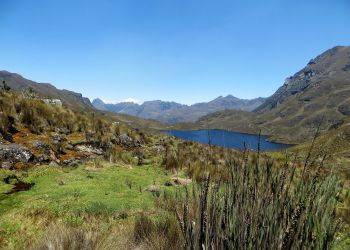
How do you find the Ecuadorian lifestyle?
Ecuadorians are very family, community, and church oriented. They are a welcoming people, with limitless patience for poor Spanish. Their lives revolve around the family, their work and leisure time is a very distant third. It's not unusual for Ecuadorians to work 6 (or even 7) days a week and twelve hours a day or more. When they do take time to celebrate, they go big and loud. Dancing, traditional foods and fireworks are the norm here. Many Ecuadorians have never left their city or town, let alone the country, even though some of the indigenous groups are losing people to the call of greener pastures in North America and Europe. The practices of the old ways and religion seem to have blended seamlessly with Catholicism, the major religion of the country.
Have you been able to adapt yourself to the country and to its society?
I think that we'll always be “gringos” here. It's a constant surprise to the locals that we can speak Spanish, but they're always excited to know that we've chosen to live here. We have both Ecuadorian and expat friends and have embraced the language and culture of the country. Interestingly, we meet many expats from other South American countries, which broadens our social circles nicely. We live much like we did in Canada, but have adapted to local food availability and have a much more active social life. I think that language will always be a struggle. I've accepted the idea that I'll never be fluent and, at times, I still get anxious when trying to deal with necessities and issues in Spanish, but this is part of why we're here, to learn a second language, embrace the vagaries and joys of the culture and experience the world in a different way.
What does your every day life in Cuenca look like?
We're pretty low key. We have our regular schedule of chores and social appointments. We fill our time with trips to the gym, long walks through the city and by the rivers. Cuenca is an ever changing landscape, with businesses coming and going, old friends leaving and new ones to be discovered. I honestly don't know how we both worked full time and got all our chores done when we were in Canada. There is a certain freedom to taking as long as you want to eat your breakfast and enjoy your morning cup of coffee.
Any particular experience in the country you would like to share with us?
The natural beauty of Ecuador is something that really needs to be experienced first hand, we've done this by trekking through El Cajas, a national park near Cuenca, touring the 3 volcanoes on a mountain bike tour and enjoying the countryside through the window of a bus or car as we've travelled to the coast or other areas.
What is your opinion on the cost of living in Cuenca? Is it easy for an expat to live there?
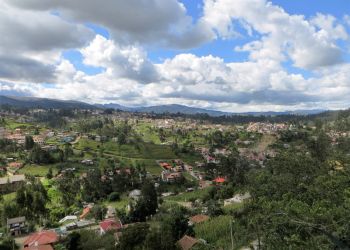
I can definitively say that the cost of living in Ecuador is less than that of Canada. Some things are more costly – for example alcohol (excluding the local beer), while others are less – housing, fresh fruit and vegetables. Luxury items tend to have a heavier price tag here, as do electronics, but for day to day expenses, the cost of living is lower in general. You must take into account the exchange rate for the Canadian dollar. When we arrived it was trading around 97 cents USD, now it's more like 76 cents, so we've lost some purchasing power. With recent increases in import taxes and the IVA (to help with the earthquake relief effort and offset income losses through the drop in oil price) things are noticeably more expensive. No one should come here just for the economic aspect as they would likely wind up unhappy.
As to being easy for expats, it depends on your approach. Many things take a long time. There is no sense of urgency in Ecuador to have things done. Attention to detail is less exacting here, which can be frustrating to North Americans, especially with business or customer service backgrounds. It is different here, in almost everyway and an expat has to be prepared for that. This isn't a little US or Canada. It's a country with its own priorities, processes and approaches. If you can accept this, then yes, it can be easy to live here, but it's definitely not for everyone.
How do you spend your leisure time?
We're big outdoor enthusiasts, so we spend a lot of time hiking in the hills that surround Cuenca. We also take in the free symphony, art galleries and festivals that are constantly on offer here. We also enjoy passing time with our friends over a drink and a good meal.
Your favorite local dishes?
The whole roasted pork (chancho) is one of our favourites and if you're brave, you can also try cuy (Guinea pig) which is a local specialty, cooked similarly to the chancho. I also like maduros (a ripe plantain, grilled over hot coals and topped with fresh local cheese) it's both sweet and salty. If you love carbohydrates, this is the place for you. Rice, potatoes, plantains and pasta are all favorites here, as are sweets. (The carbohydrates help you process oxygen more efficiently at high altitude. Cuencanos, generally, aren't hugely adventurous when it comes to food, enjoying familiar food that isn't too spicy. The restaurant scene in Cuenca has improved vastly over the past couple of years and you can enjoy dishes from several different countries now.
What do you miss the most about your home country?
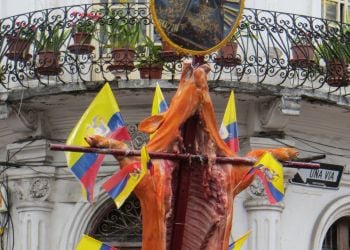
It's easy to miss the ease in which I navigated life and, of course, the wide selection of food from different countries. I was very spoiled and had the world's food at my finger tips, and now I have to try and recreate it at home. It's also hard to be away from family, especially for major life events and favourite holidays, but with our broadening social group, we don't feel the lack as much.
What has motivated you to write your blog “Beyond the Gentle Island”? How does it help?
Originally, the blog was for family and friends, so they could keep up with our lives when we moved to the other side of the country. Now, it serves more as a platform to help travellers and expats as well as keeping our loved ones up to date on what's going on in our lives.
Would you like to give any advice to soon-to-be expatriates in Ecuador?
The best piece of advice I can give is that you should really plan to visit for 3 to 6 months before making any big decisions. (I'd say a year, but the longest tourist visa available is 180 days). Don't jump in and buy property without understanding if you can live with the very different life style. After 3 months, the “honeymoon” (where you feel like you're on vacation still) phase ends and over the next few months your life is more realistic. Don't forget to budget for Spanish lessons, or “fixers” that will help you navigate the intricacies of Ecuadorian government agencies, service companies and even grocery shopping.
What are your plans for the future?
That's always a hard question for us, as we find that any plans we make, at least in the long term, usually fall victim to life happening. Most of our long term plans go awry. For now, we're planning on discovering what South America has to offer by getting to as many places as we can. We think of ourselves less as expats, but more like wanderers, discovering new places. I'm sure we'll eventually go back home, to Canada, once we've seen what we want of the world.



















